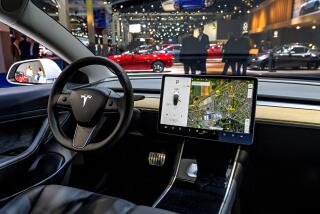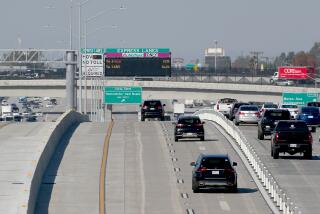Carmakers quibble over the obvious: Hands-free is not risk-free
It’s always amazing that we need academic studies to state the obvious, such as the one in the Journal of Social and Clinical Psychology a few years ago finding that people are happier during weekends.
No less amazing, though, is the knee-jerk reaction from businesses when a common-sense study comes anywhere close to threatening profits. They routinely say that the findings are inconclusive and that more research is needed.
Is it any wonder it’s so hard to get anything done?
The latest example of a study confirming what most of us — if we’re honest — knew already came this week from the American Automobile Assn., which hired researchers at the University of Utah to look into whether doing other stuff while we’re driving is dangerous.
The study concluded that, yep, it is.
Specifically, it found that hands-free, voice-activated technologies increasingly being used to access email or social media represent “significant impairments to driving that stem from the diversion of attention from the task of operating a motor vehicle.”
Listening to the radio or chatting with passengers aren’t too risky, the study found. Yakking away on a cellphone, whether hand-held or hands-free, is worse. But devoting attention to voice-activated gizmos poses an “extensive” safety risk.
AAA estimated that about 9 million vehicles on U.S. roads already can send voice-activated messages. That number will soar to more than 62 million by 2018, the organization said.
“These findings reinforce previous research that hands-free is not risk-free,” said Peter Kissinger, head of the AAA Foundation for Traffic Safety, which commissioned the study. “Increased mental workload and cognitive distractions can lead to a type of tunnel vision or inattention blindness where motorists don’t see potential hazards right in front of them.”
Gosh.
So now that we know it’s better to concentrate on the road than on, say, work or your social life, what do we do about it? AAA recommends that automakers limit use of voice-activated technologies to driving-related stuff such as controlling the temperature of the car.
The organization is also urging the auto industry to cut off access to certain voice-activated features, such as email and social media, while a vehicle is in motion.
So what does the auto industry have to say?
“Our primary concern is that this study could send a misleading message to consumers,” Gloria Bergquist, vice president of the Alliance of Automobile Manufacturers, told me. “Clearly, using hands-free is safer.”
Safer than hand-held, that is. But that’s not quite what the AAA study concluded. It focused instead on whether voice-activated communications require brainpower that would otherwise go toward getting you to your destination in one piece.
On that score, Bergquist said it has yet to be proved conclusively that voice-activated technologies, including those that allow brief emails or Facebook posts, impair a person’s ability to drive safely.
“We believe voice-activated systems enhance safety,” she said. “You can keep your hands on the wheel and your eyes on the road.”
More research into the matter is needed, Bergquist added.
And that’s basically the same thing the tobacco industry said when confronted with studies showing that cigarettes were addictive and killed people.
It’s what the food and beverage industries said when confronted with studies showing that sugar, salt and fat were leading causes of the global obesity epidemic.
Heck, it’s what the auto industry also said when confronted with studies showing that seat belts and air bags would significantly reduce accident-related injuries and fatalities.
In each case, the potential threat to corporate profit was countered with obfuscation and foot-dragging that delayed implementation of reforms for years.
I don’t begrudge businesses looking after their own needs. That’s capitalism.
The question here is why corporate interests play such a large role in discussions of public safety. We typically treat the corporate viewpoint as being equal in validity to an impartial scientific study.
It’s not. The corporate perspective is almost always guided first and foremost by self-interest — the impact on profit. It’s seldom, if ever, guided by public welfare.
Automakers opposed seat belts and air bags because they believed the technologies would raise prices and thus reduce sales. If profit is your primary concern, then those are legitimate worries.
The reality, of course, is that seat belts and air bags made driving demonstrably safer, and the added costs, when spread over millions of vehicles, were negligible.
According to the National Highway Traffic Safety Administration, seat belts alone saved an estimated 12,546 lives in 2010. More than 72,000 lives were saved from 2005 through 2009.
There will be some who will jump up and down about nanny-state tyranny when it comes to telling people what they can and can’t do in their own cars. That’s understandable.
And if you were driving alone in the middle of the desert, then I’d agree you can behave as irresponsibly as you please. But, chances are, you do most of your driving on roads and freeways amid many other people.
Reckless behavior behind the wheel, therefore, poses a risk not just to you but to those around you. You have a responsibility to mitigate that risk. Personal freedom does not give you the right to endanger others.
Researchers say it’s dumb — and dangerous — to socialize electronically while driving.
The auto industry says it’s not.
What do you say? And are you willing to stake your life on it?
David Lazarus’ column runs Tuesdays and Fridays. He also can be seen daily on KTLA-TV Channel 5 and followed on Twitter @Davidlaz. Send your tips or feedback to david.lazarus@latimes.com.







